Do you have a question about the Kenwood DNX694S and is the answer not in the manual?
General safety and handling advice for operating the unit, including care and disc usage.
Explains the process for the unit to acquire GPS satellite signals for initial use.
Provides guidelines for smartphone usage to ensure optimal performance and avoid issues.
Critical safety advice, warnings, and legal disclaimers for operating the navigation system safely.
Details potential hazards and cautions related to using the navigation system as an aid.
Explains how to interpret the manual's content, screen examples, and language indications.
Guidance on preserving vehicle battery life when using the navigation system.
Information about the source and potential limitations of the map data used in the system.
Detailed explanation of each button on the unit's front panel and their functions.
Step-by-step instructions on how to power the unit on and off, including a note on initial setup.
Guide for performing the initial setup of the unit upon first use, covering various system parameters.
Instructions for setting the calendar and clock, including synchronization and manual adjustment.
Describes how to adjust the unit's volume using the physical controls or touch screen.
Explains the various touch gestures like touch, touch and hold, flick, and swipe for screen interaction.
Details the various components and functions available on the HOME screen for easy access.
Describes the source selection screen, which displays all available playback sources and options.
Instructions on how to select various playback sources like Navigation, USB, iPod, etc.
Steps to place the unit into standby mode for power saving or temporary shutdown.
Guide on how to rearrange or customize the shortcut icons displayed on the HOME screen.
Describes the functions and indicators available on the source control screen for managing playback.
Explains how to access the popup menu and its various options for quick access to functions.
Instructions on how to turn off the unit's screen while keeping other functions active.
Describes common function keys and operations available on list screens for various sources.
Steps to display the main navigation screen from the unit's interface.
Explains how to operate the navigation system, find destinations, and follow routes.
Instructions on how to add an intermediate stop to an active route.
Guidance on how to reroute the navigation to avoid current traffic conditions.
Steps to manually avoid traffic delays on the current navigation route.
Explains how to view the traffic map, which displays color-coded traffic flow and delays.
Instructions on how to purchase and install updated map data for the navigation system.
Explains how to control audio sources while the navigation screen is displayed.
Details on how to receive traffic and weather information via the KENWOOD Traffic app.
Instructions on inserting and ejecting discs for playback.
Explains basic operations for playing DVD and VCD discs, including screen controls.
Details on navigating and interacting with DVD disc menus during playback.
Describes the function panel used for disc playback controls and settings.
Covers basic operations for playing Music CDs and other disc media, including control screens.
Instructions on how to search for music or video files on disc media using various methods.
Detailed steps for searching files by hierarchy within folders.
Explains how to set up various items within the DVD-VIDEO disc menu during playback.
Describes how to use highlight control for navigating DVD menus directly on the screen.
Guide to setting up various DVD playback parameters like screen ratio and language.
Instructions for setting the language for menus, subtitles, and audio tracks on DVDs.
Step-by-step instructions for connecting a USB device to the unit.
Guidance on how to properly insert a microSD card into its slot.
Explains the basic operations for controlling playback and functions from USB and microSD devices.
Instructions on how to search for music or video files using category, link, or folder search.
Steps to search files by selecting a category like artist, album, or genre.
Instructions for searching for files related to the current track's artist, album, or genre.
Steps to search files by navigating through the folder hierarchy.
Detailed instructions for connecting iPod/iPhone devices via wired connection.
Explains basic operations for controlling iPod/iPhone playback and functions.
Instructions on how to search music files using category or link search for iPod/iPhone.
Steps to search music files by selecting categories like artists, albums, or genres.
Instructions for searching files based on artist, album, genre, or composer of the current track.
Guide on using Apple CarPlay to access iPhone features while driving.
Instructions on activating and using Siri voice control with the connected iPhone.
Guide on using Android Auto to access Android device features conveniently while driving.
Instructions on using voice commands for controlling Android Auto features.
Guide on listening to Pandora through the unit by controlling the smartphone app.
Explains how to select, sort, and manage stations within the Pandora station list.
Steps for creating new Pandora stations based on artists, tracks, or genres.
Guide on listening to Spotify through the unit by controlling the smartphone app.
Instructions on how to select tracks, categories, and stations within the Spotify interface.
Overview of basic operations for controlling the HD Radio tuner source.
Information on receiving and managing emergency alert messages from the HD Radio tuner.
Instructions on how to view previously received alert messages from the log.
Explains how to set the radio broadcast receive mode (Auto, Digital, Analog).
Covers memory operations like auto memory and manual memory for storing radio stations.
Introduces various selection operations for HD Radio tuner, including preset and direct search.
Instructions for listing and selecting memorized radio stations or channels.
Steps to tune into a desired HD Radio channel by entering the frequency or channel number.
Instructions on how to specify and select a desired HD Radio channel.
Guide on tuning to FM stations based on specific program types.
Explains bookmarking songs to store tag information and detailed song data.
Instructions on displaying registered bookmarks and their detailed information.
Steps for deleting selected bookmarks from the list.
Functionality for receiving alert messages, including snooze and ignore options.
Instructions on how to read received alert messages afterward from the log.
Overview of basic operations for controlling the SiriusXM satellite radio tuner.
Describes the function bar keys for category search, replay, and channel selection.
Details the functions available on the SiriusXM function panel for direct channel search and setup.
Instructions on how to store current SiriusXM channels into the preset memory.
Guide on listing and selecting memorized SiriusXM stations or channels from the preset list.
Steps to tune directly to a SiriusXM channel by entering its number.
Instructions on selecting a category and then a channel for SiriusXM.
Explains how to replay the last 60 minutes of the current SiriusXM channel.
Describes TuneMix™ feature for creating custom channels from favorite SiriusXM channels.
Explains TuneScan™ feature for playing song samples from SmartFavorite channels.
Instructions on accessing the latest traffic and weather reports for a selected city.
Functionality to receive alerts when programs related to registered artists or songs start.
Notification feature for big plays during sports games of favorite teams.
Introduces the section for configuring various SiriusXM settings.
Steps to set a parental code for managing content access on SiriusXM.
Feature to prevent unauthorized access to mature content and selected channels.
Allows setting undesired channels to be skipped during playback.
Configuration for setting up alerts for specific content like artists, songs, or games.
Configuration for activating and selecting favorite sports teams for SportsFlash alerts.
Allows selection of a city to receive SiriusXM Traffic & Weather broadcasts.
Setting to automatically start songs from the beginning when tuning to a SmartFavorite channel.
Resets all SiriusXM settings to their default values.
General information about Bluetooth technology and its use with the unit.
Details the Bluetooth specifications, profiles, and audio codecs supported by the unit.
Step-by-step guide to register Bluetooth audio players or cell-phones with the unit.
Introduces the section for configuring various Bluetooth settings.
Instructions for connecting a Bluetooth device by selecting it and setting its profile.
Steps to remove previously registered Bluetooth devices from the unit.
Instructions for changing the Bluetooth PIN code for security.
Steps to change the Bluetooth device name that appears when pairing.
Guide on playing audio from a connected Bluetooth device via the unit.
Instructions for connecting devices for Bluetooth audio playback (A2DP) or app control (SPP).
Steps to search for music files from a connected Bluetooth device.
Section dedicated to using the hands-free telephone function via Bluetooth.
Detailed instructions on how to make phone calls using the unit's hands-free system.
Instructions on making calls using preset phone numbers stored in the unit.
Steps to make calls by selecting contacts from the phonebook.
Guide on accessing and using the cell-phone's voice recognition function.
Instructions on how to answer or reject incoming phone calls using the hands-free system.
Details on adjusting volume, muting voice, switching output, and call waiting.
Function to register frequently used phone numbers for quick dialing.
Instructions on transferring the phonebook from a Bluetooth smartphone via PBAP.
Steps to delete registered phonebook entries from the unit.
Configuration options for various aspects of the hands-free function.
Information on connecting and using cameras, including front, dashboard, and rear views.
Configuration settings for rear cameras and front/dashboard cameras.
Guide on adjusting parking guidelines for easier parking when using a rear camera.
Information on using the optional dashboard camera for video recording and playback.
Instructions for connecting and playing audio/video from external components via the AV-IN terminal.
Information on accessing vehicle-specific features via an iDataLink connection.
Adjusting image quality, brightness, contrast, and aspect ratio for the monitor.
Introduces the section for configuring core system parameters.
Customizing user interface parameters like language and clock settings.
Explains how to set up various user interface elements like beep, parking assist, and language.
Steps for manually setting the unit's date and time, including time zone.
Procedure for adjusting the touch panel's sensing position for accurate input.
Section for configuring special parameters like demo mode and power off functions.
Instructions on how to check the unit's software version and related information.
Configuration options for display settings like dimmer, OSD clock, and key color.
Guide on setting the button illumination color, including scanning and registering custom colors.
Instructions for changing the background image or color of the unit's display.
Configuration for AV parameters like AV-OUT source and CarPlay sidebar position.
Guide to setting up speaker types, sizes, and crossover networks for optimal sound.
Detailed steps for setting crossover frequencies for speakers and subwoofers.
Adjusting general audio settings like fader, balance, and center.
Adjusting equalizer settings, including gain levels, presets, and saving custom curves.
Fine-tuning volume levels of different sources to minimize volume differences.
Allows selecting different audio sources for front and rear positions in the vehicle.
Setting sound effects like bass boost, loudness, drive equalizer, space enhancer, and supreme.
Optimizing the sound field based on seating position and adjusting delay/level settings.
Focusing the imaginary sound image in front of the selected seat, including fine adjustment.
Instructions for installing batteries in the remote control unit.
Details the functions of various buttons on the remote control and how they operate.
Explains how to switch the remote control's operation mode based on the source.
Instructions for directly searching for content using the remote control's numeric keypad.
Important precautions and warnings to follow before proceeding with the unit's installation.
Lists and illustrates the various accessories supplied for the installation of the unit.
Step-by-step instructions for the installation process of the unit into the vehicle.
Specific guidance on installing the unit in non-Japanese and Japanese cars, including trim plates.
Instructions for installing the GPS antenna inside the vehicle for optimal signal reception.
Guidance on positioning and installing the microphone unit for hands-free calls.
Instructions for removing the trim plate from the unit, specifically for the DNX694S model.
Steps for safely removing the unit from its mounting in the vehicle.
Detailed diagram and explanation of connecting various wires to the unit's terminals.
Diagram showing connections for external components like audio, GPS, microphone, and cameras.
Instructions for connecting USB devices to the unit's USB terminals.
Guidance on securing the USB extension cable to prevent disconnection.
Instructions for connecting iPod/iPhone devices using a Lightning connector or USB.
Instructions for connecting Android smartphones via USB cable.
Instructions for connecting the optional dashboard camera to the unit.
A table listing common issues and their corresponding solutions for various unit functions.
Information about error messages displayed on the screen and their causes.
Troubleshooting steps for common disc playback errors like unplayable or read errors.
Steps to resolve the "No Device" error when a USB device is not recognized.
Solutions for common issues related to SiriusXM tuner connectivity, subscription, and signal.
Lists the types of discs and file formats supported by the unit for playback.
Details the supported audio and video file formats, including bit rate and codec information.
Explains DVD region codes and operation regulatory marks related to disc compatibility.
A comprehensive list of language codes used for DVD menus, subtitles, and audio tracks.
Detailed technical specifications covering monitor, DVD player, USB, SD, and audio sections.
Technical specifications related to Bluetooth technology, frequency, profiles, and audio codecs.
Specifications for video input/output levels and color systems.
Specifications for audio output power, frequency response, and impedance.
Specifications for the GPS receiver, acquisition times, accuracy, and antenna.
Information about unit copyrights, trademarks, and licensing agreements for software.
FCC warnings regarding radio frequency energy, interference, and user modifications.
Notices from Industry Canada regarding device compliance and operating conditions.
| Display Size | 6.8 inches |
|---|---|
| Resolution | 800 x 480 pixels |
| GPS Navigation | Yes |
| Bluetooth | Yes |
| Apple CarPlay | Yes |
| Android Auto | Yes |
| Touchscreen | Yes |
| HD Radio | Yes |
| SiriusXM Ready | Yes |
| DVD/CD Player | Yes |
| AM/FM Tuner | Yes |
| Voice Control | Yes |
| Steering Wheel Control | Yes |
| Backup Camera Input | Yes |
| Audio Formats Supported | MP3, WMA, AAC, FLAC |
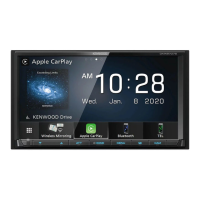
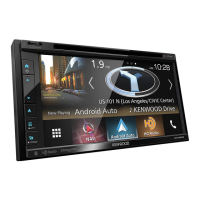




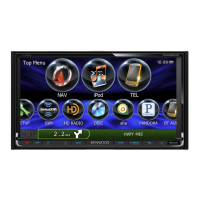
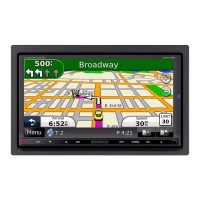
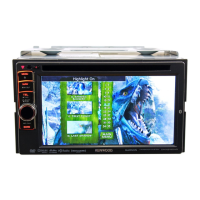


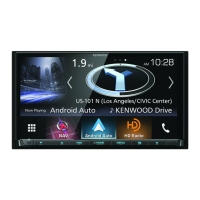
